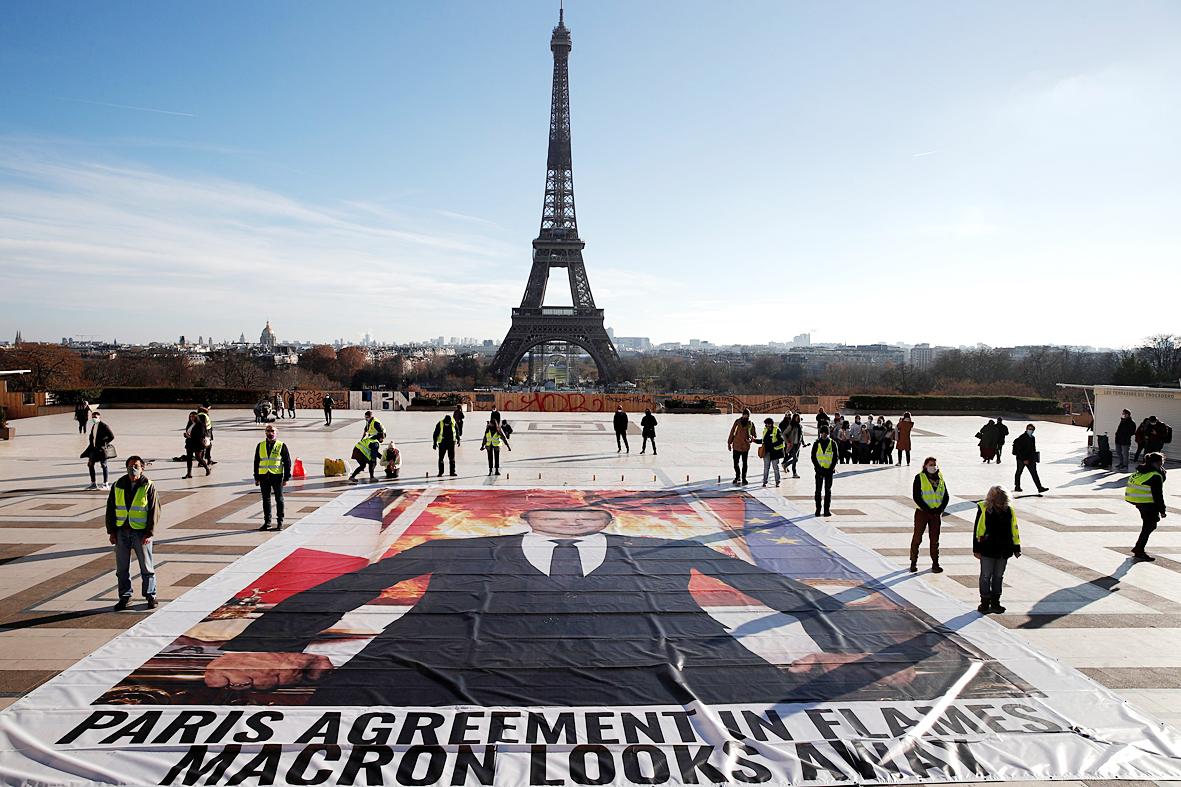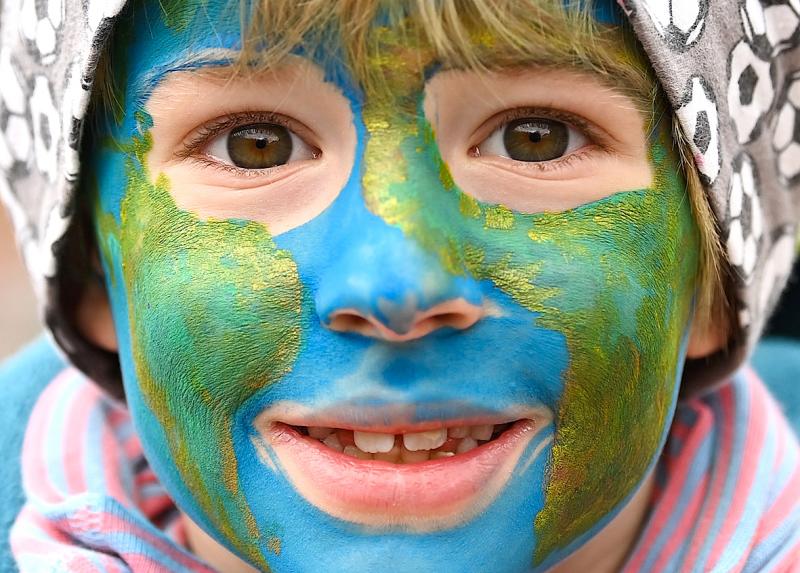COP26 climate talks in Glasgow starting on Sunday may be the world’s best last chance to cap global warming at the 1.5-2 degrees Celsius upper limit set out in the 2015 Paris Agreement.
The stakes for the planet are huge — among them the impact on economic livelihoods the world over and the future stability of the global financial system.
Here are 10 climate change-related questions that economic policy-makers are trying to answer:

Photo: REUTERS
HOW MUCH DOES CLIMATE CHANGE COST?
From floods and fires to conflict and migration: economic models struggle with the many possible knock-on effects from global warming. The ballpark IMF estimate is that unchecked warming would shave 7 percent off world output by 2100. The Network for Greening the Financial System (NFGS) group of world central banks puts it even higher — 13 percent. In a Reuters poll of economists, the median figure for the output loss in that scenario was 18 percent.
WHERE IS THE IMPACT GOING TO BE FELT HARDEST?

Photo: AP
Clearly, the developing world. Much of the world’s poor live in the tropical or low-lying regions already suffering climate change fall-out like droughts or rising sea levels. Moreover their countries rarely have the resources to mitigate such damage. The NFGS report projects overall output losses of above 15 percent for much of Asia and Africa, rising to 20 percent in the Sahel countries.
WHAT DOES THAT MEAN FOR INDIVIDUAL LIVELIHOODS?
Climate change will drive up to 132 million more people into extreme poverty by 2030, a World Bank paper last year concluded. Factors included lost farming income; lower outdoor labour productivity; rising food prices; increased disease; and economic losses from extreme weather.
HOW MUCH WILL IT COST TO FIX IT?
Advocates of early action say the sooner you start the better. The widely used NiGEM macroeconomic forecast model even suggests an early start would offer small net gains for output thanks to the big investments needed in green infrastructure. The same model warns of output losses of up to 3 percent in last-minute transition scenarios.
WHO LOSES OUT IN A “NET ZERO” CARBON WORLD?
Primarily, anyone with fossil fuel exposure. A report by think tank Carbon Tracker last month estimated that over US$1 trillion of business-as-usual investment by the oil and gas sector would no longer be viable in a genuinely low-carbon world. Moreover the IMF has called for the end of all fossil fuel subsidies — which it calculates at US$5 trillion annually if defined to include undercharging for supply, environmental and health costs.
WHAT SHOULD CARBON REALLY COST?
Tax or permit schemes that try to price in the damage done by emissions create incentives to go green. But so far only a fifth of global carbon emissions are covered by such programs, pricing carbon on average at a mere US$3 a tonne. That’s well below the US$75/tonne the IMF says is needed to cap global warming at well below 2°C. The Reuters poll of economists recommended US$100/tonne.
WOULDN’T THAT LEAD TO INFLATION?
Anything which factors in the polluting cost of fossil fuels is likely to lead to price rises in some sectors — aviation for example. That could in turn lead to what central banks define as inflation — broad-based and durable price rises across the whole economy. Yet history shows this hasn’t necessarily been the case: carbon taxes introduced in Canada and Europe pushed overall prices lower because they cut into household income and hence consumer demand, a recent study showed. It is also true that doing nothing could lead to inflation: a European Central Bank paper last year warned of food and commodity price rises from extreme weather events and the land shortages being caused by desertification and rising sea levels.
ARE GREEN ADVANCES REALLY DECOUPLING EMISSIONS FROM ECONOMIC GROWTH?
Genuine sustainable growth implies that economic activity can grow as needed without adding yet more emissions. This is the holy grail of “absolute decoupling.” But so far, any decoupling has either been largely relative — in the sense of merely achieving higher rates of economic growth than gains in emissions — or achieved by shifting dirty production from one national territory to another. And that is why, for now, global emissions are still rising.
WHO BEARS THE BRUNT OF TRANSITION?
The idea of “Just Transition” has been espoused by bodies such as the European Union to acknowledge that the transition to net zero should happen in a fair way — for example by ensuring low-income groups are not made worse-off. At a global scale, the rich countries which since their industrial revolutions have generated the bulk of emissions have promised to help developing countries transition via US$100 billion of annual transfers — a promise so far not fulfilled.
COULD THIS SPARK A FINANCIAL CRISIS?
The global financial system needs to be insulated against both the physical risks of climate change itself and the upheavals likely to happen during a transition to net zero. Central banks and national treasuries are calling on banks and other financial players to come clean about the exposure of their books to such risks. The ECB and other regulators have made it clear there is a long way to go on this.

Taiwan has next to no political engagement in Myanmar, either with the ruling military junta nor the dozens of armed groups who’ve in the last five years taken over around two-thirds of the nation’s territory in a sprawling, patchwork civil war. But early last month, the leader of one relatively minor Burmese revolutionary faction, General Nerdah Bomya, who is also an alleged war criminal, made a low key visit to Taipei, where he met with a member of President William Lai’s (賴清德) staff, a retired Taiwanese military official and several academics. “I feel like Taiwan is a good example of

March 2 to March 8 Gunfire rang out along the shore of the frontline island of Lieyu (烈嶼) on a foggy afternoon on March 7, 1987. By the time it was over, about 20 unarmed Vietnamese refugees — men, women, elderly and children — were dead. They were hastily buried, followed by decades of silence. Months later, opposition politicians and journalists tried to uncover what had happened, but conflicting accounts only deepened the confusion. One version suggested that government troops had mistakenly killed their own operatives attempting to return home from Vietnam. The military maintained that the

Jacques Poissant’s suffering stopped the day he asked his daughter if it would be “cowardly to ask to be helped to die.” The retired Canadian insurance adviser was 93, and “was wasting away” after a long battle with prostate cancer. “He no longer had any zest for life,” Josee Poissant said. Last year her mother made the same choice at 96 when she realized she would not be getting out of hospital. She died surrounded by her children and their partners listening to the music she loved. “She was at peace. She sang until she went to sleep.” Josee Poissant remembers it as a beautiful

Before the last section of the round-the-island railway was electrified, one old blue train still chugged back and forth between Pingtung County’s Fangliao (枋寮) and Taitung (台東) stations once a day. It was so slow, was so hot (it had no air conditioning) and covered such a short distance, that the low fare still failed to attract many riders. This relic of the past was finally retired when the South Link Line was fully electrified on Dec. 23, 2020. A wave of nostalgia surrounded the termination of the Ordinary Train service, as these train carriages had been in use for decades